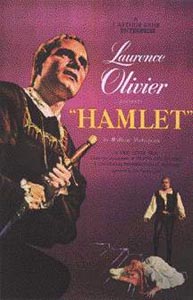| 
Hamlet
had at least 15 other film adaptations made of it
prior to Laurence Olivier's 1948 Best Picture winner.
| An Australian
film titled The Mutiny of the Bounty depicted the story
of Captain Bligh and Fletcher Christian in 1916, nineteen
years before the MGM film Mutiny on the Bounty won
Best Picture. But the Charles Laughton/Clark Gable version
is based on the 1932 novel Mutiny on the Bounty by
Charles Nordhoff and James Norman Hall, and it is unlikely
that the makers were even aware of the 50 minute-long silent
film's existence. Some Oscar quizzes list Mutiny on the
Bounty as the first Oscar remake because the two films
are based on the same historical event, but madbeast.com doesn't
consider the 1935 Mutiny on the Bounty to be a remake
of the 1916 silent film any more than the 1963 version of
Cleopatra to be an adaptation of Shakespeare's play
Antony and Cleopatra because they use the same historical
events to base their stories on, or James Cameron's film of
Titanic to be a remake of A Night to Remember for
the same reason. Another
Australian film drew its inspiration from the Bounty's mutiny,
the 1933 entry In the Wake of the Bounty. But the former
was actually an hour long documentary of the contemporary
inhabitants of Pitcairn Island, with only a few brief scenes
of Fletcher Christian (incompetently played by a youthful
Errol Flynn) and Captain Bligh thrown in to provide an historical
context. It is
doubtful Olivier's film of Hamlet was influenced by
any of the previous film versions (most of which were made
during the silent era), but since all of the films of Hamlet
used Shakespeare's play as the same literary source, they
can reasonably be considered to be remakes of film adaptations
dating back to the nineteenth century featuring actors like
Sarah Bernhardt and Johnston Forbes-Robertson.
|
Other
Best Pictures that could be considered remakes are Ben
Hur
The 1959 Oscar winner was a remake of the 1925 silent film
of the Lew Wallace novel starring Ramon Novarro and
Francis X. Bushman. Oliver!
Charles Dickens' novel has been adapted for the screen since the
earliest days of the silents, most famously in 1920 (with
Jackie Coogan as Oliver and Lon Chaney as Fagin) and 1948
(David Lean's definitive version starring Alec Guinness as Fagin)
before the saccarhine musical version won the 1968 Best Picture
Oscar. My
Fair Lady
Bernard Shaw's tale of Henry Higgins and Eliza Doolittle was
a 1938 Best Picture nominee in its non-musical version of Pygmalion
before winning the 1964 Best Picture Oscar in its incarnation
as a Lerner and Lowe musical. Chicago
The source of the Bob Fosse musical was a play by
Maurine Dallas Watkins that had been filmed previously
as a 1927 silent film titled Chicago and a 1942 non-musical
talkie titled Roxie Hart. The
Lord of the Rings: The Return of the King
J.R.R. Tolkein buffs would cringe at the idea of Peter Jackson's
masterful
films of the trilogy being a remake of Ralph Bakshi's 1978
retched cartoon version, but both were adaptations of Tolkein's
fanciful tales of the inhabitants of Middle Earth. The Departed
Martin Scorsese's 2006 cop melodrama was inspired by the
2002 Hong Kong police thriller Mou gaan dou. CODA
The 2021 Best Picture was inspired by a 2014 French film titled The Bélier Family Return to Jonny's Oscar Trivia
Quiz
|
